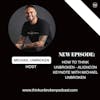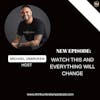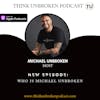E173: Rise, Fight, Love, Repeat with Jeff Wickersham | Trauma Healing Coach
In this episode, I sit with my great friend, Jeff Wickersham. Jeff has an amazing story about creating massive change in his life after really hitting the pitfall that every one of us will face, and that's losing a parent. Unfortunately, he lost a...
See show notes at: https://www.thinkunbrokenpodcast.com/e173-rise-fight-love-repeat-with-jeff-wickersham-trauma-healing-coach/#show-notes
In this episode, I sit with my great friend, Jeff Wickersham. Jeff has an amazing story about creating massive change in his life after really hitting the pitfall that every one of us will face, and that's losing a parent. Unfortunately, he lost a parent to breast cancer, his mother.
So this episode is a little bit emotional. So I'll give you a little bit of preface there, but it's super empowering, incredibly powerful, and in an episode that it's going to be near and dear to my heart for a long time.
So you're in this position in your life, you're trying to figure out how you turn pain into purpose, you're trying to figure out this ethos, this idea of who you are and what you live by, you're trying to get into routines and habits to overcome loss, to go to the next level in your life, you're going to really enjoy this episode because Jeff gives out step-by-step game plans, tools, and practical tips to help you do that.
I talk about this all the time on this show. You guys know how I feel about habits, routines, and goals, and sometimes I'm very pointed in them because it's such a part of my life. I have deep with Jeff today to help people understand how to leverage these tools, build them as skills and adapt them in your life, and then help them take you to the next level.
So this episode is really powerful; I loved it a lot, we both got a little emotional here, and it's one that I'm going to remember for a very long time. So I'm very excited to share it with you; thank you as usual for being here!
Learn more about Jeff Wickersham at: https://www.themorningfire.com/
Get a Paperback copy of Think Unbroken Understanding and Overcoming Childhood Trauma for FREE at: https://book.thinkunbroken.com/
Learn more about Coaching Program: https://coaching.thinkunbroken.com/
Learn more about at: https://www.thinkunbrokenpodcast.com/
Support the Podcast: Become a listed sponsor!
Follow me on Instagram @MichaelUnbroken
Learn more about coaching at https://coaching.thinkunbroken.com
Get your FREE copy of my #1 Best-Selling Book Think Unbroken: https://book.thinkunbroken.com/
Michael: Hey! What's up, Unbroken Nation! Hope that you're doing well, wherever you are in the world today. Super excited to be back with you and another episode with my great friend, Jeff Wickersham. Jeff, my man, how are you? What is going on in your world today?
Jeff: I am doing fantastic, Michael, thank you for having me. I'm pumped up, excited, ready to get into this conversation today.
Michael: Yeah, me too, man. And Jeff, I love about, brothers. You always bring the energy so this will be really great, especially for Unbroken Nation, if you're at the gym, if you're getting your day started, is going to be a good one. Jeff, before we dive in though, can you create a little context, tell the audience a little bit about yourself and how you got to where you are today?
Jeff: Yeah, absolutely. And really, it the story starts about eight years ago when, unfortunately, I had that life event, that kind of changed everything, right? I lost my mom to breast cancer and when you lose the woman that brought you into this world, see her take her last breath, that it fundamentally changes you at your core. So at that time, I question everything, I was in Corporate America; I was in the corporate space at that time, having me was Corporate America, having me bound out of bed on fire in the morning, and the answer came back, resoundingly know. So I went opened up a gym locally and then what organically grew out of that was high-performance coaching and how we set up our days for success. What are the bookends of your day look like that last 30 minutes? How do you prepare for success in the morning and then what are those first 30 minutes look like?
So I went down that journey, wrote a book, hosts a podcast, just eat, sleep and breathe it on a daily basis. I'm a practitioner, I'm not somebody that you know, doesn't do the work, I'm in there every single day and it's pretty incredible to do that.
Michael: Yeah, I love that man. And you know what? I think that unfortunately and I've been trying to find the solution to this equation of, can you create massive change in your life with mitigating the risk of hitting a moment that pivotally shifts you? And I think astoundingly the answer is no. And so I'm really curious, you know, looking at going through this moment where you create change in your life. How did you decide to step into that? Because I think really quite often we hit these, you know, rock bottom after rock bottom or impactful moment; after impactful moment we sit here, we look at it from the outsider perspective and we go, I guess it's just life, but for whatever reason, there are certain people in the world where you say, you know what? Actually, I'm going to do this other thing. Like, talk through what that process is like?
Jeff: I would say it was deep self-discovery, right? After her passing just questioning, everything about life knowing it's so fragile in nature, right? That one moment you're here, the next moment you're not and probably the last deep conversation I had with her was about legacy and her fear prior because she was going on, hospice care at this point.
So the end was, you know, out there in the not too distant future, she wanted to leave a legacy because she had seven grandchildren and through that discussion, somehow, the Baton was I passed to me and through my self-discovery, through really the pain and the recovery and I don't know if you ever recover it's always seared into your heart and soul and your memory in some point, I chose to make the decision that I'm going to use this as fire as that spark to ignite me and go out and help serve to lead others because I know so many people out there, I call it it's a world full of walking zombies right there at they're going through the motions day in day out its same thing, they're telling themselves they're happy, but truly, they're not in the back of their mind. So self-discovery, just going through how am I living my life on a daily basis? And what's my purpose? What's my mission? And when I came back and asked myself, those questions, I didn't have an answer. I knew that was an issue.
Michael: Yeah, that's powerful. And asking yourself, those kinds of questions, take a tremendous amount of, not only vulnerability, but I think you have to face some of your inadequacy in that and you have to recognize what's really going on in your life? And I think you've pointed to something really powerful in that looking at the perspective of people walking around a zombie. I hate to say that would be anything other than the truth, especially looking at the consumption of the way that we exist in the world we're in today. So and I don't want to be dismissive, right? Because I recognize and I understand that, you know, yes, it's covid and yes, people have had traumatic experiences in their life, and yes, life is fucking hard. Period. I don't want to be disappointed in that. But I think that there's a place where you have to unabashedly, look at your life and recognize, this isn't what I want and do something about it. But how do you navigate that when the world is telling you should be satisfied with good enough?
Jeff: It's a difficult decision to make to say, you know what? I'm going to stand up, this is not what I want to do personally, professionally, I am not going to follow that common path that society tells us to go on. It can be a very, very difficult venture, I'll tell you from personal experience, it can be incredibly fucking lonely when you say no I'm doing these things that set me up for success, I'm not hanging out drinking till 2:00 in the morning, I'm not doing the crap that doesn't get you to where you need to be personally and professionally. And I feel like society has put those chains around us, right? One us to be that square peg that fits into round hole and have a job and have two and a half kids and a white picket fence in this belief that's all you can be and there's so much more potential untapped potential in people, but it can be an incredibly lonely journey.
So my only piece of advice, there is to find others that are going through that same journey, that same self-discovery, bumped with them, have mentors, have groups because that's where you can truly get it that camaraderie, that jet fuel that you'll to allow you to break free.
Michael: Yeah, and I think you do have to do it with other people. I think about this a lot; any time I've ever tried to do something on my own, it's kind of like the old proverb, it's like, if you want to go far, you know, go with a group. If you want to go fast, go alone. And I'm always saying like I want to go far like I want to go as far as humanly possible, but I think what the juxtaposition is that you do have to actually start that process on your own and you've talked about something that is near and dear to my heart and that's the power of your morning and your routines and your habits. And you know, what, I'll be honest with you, I think that people at this point in the world that we live in, we talked about this idea about the power of habits ad nauseam, but there's something to it that I still find a tremendous amount of value in discussing it because I don't think people really fully understand what it means. So what I know about you Jeff that you bring to the table in a little bit different way is talking about the science of habits. So I would love for you to dive into that a little bit, so we can create some context of how you really start to navigate and create change in your life.
Jeff: Absolutely. I love habits, they are what creates our future success, right? 90 to 120 days down the road, so, whatever you're doing now, just know that is going to pay dividends down the road. But the science of habit, so, one of the things I say is, as we've kind of been lied to, as a society, everybody's heard 21 days to make a habit, right? I'm raising my hand if you're listening to this. 21 days, is the bare minimum to actually create a habit. Neuroscience has proven it out now, it can be anywhere from 21 to 67 days and typically, at 21 days that might be the hardest point to get through but when you've heard 21 days, you have that expectation that, hey, if I get three weeks into the gym, come January, 1st, 3rd week in January I've made it but then all of a sudden you crumble, you're not upset, you're not set up for success when you don't know the science behind it, the statistics the data, right? Because it could be three times longer than what you're prepared for and what your expectations are it's why the third week of January is the most depressing week in the year because 80 to 85 percent of people fall off for any New Year's resolution that they want to do. So that's the first thing, 21, 267 days to create a long-term sustainable habit.
The other piece is starting small, right? So many people want to go so fast so quickly, right? And consistency is so much more than important than intensity, right? Start out small, continue to build up. Don't go if we're talking about the gym, don't go in and do an hour-and-a-half 90-minute workout when you haven't worked out in 10 years, what's going to happen? You're going to be so sore, you're not going to be able to get off the toilet or walk down the steps then you relate soreness to exercise then you make that connection in the mind is going to say, I don't want to go through that pain anymore. So, you know, one is having the science of habits to is starting small and building up rather than saying, I'm just going to go crazy to sprinting out of the gates. Consistency is more important than intensity.
Michael: Yeah, and I faith, I think we've all had that moment where like – I cannot sit down; I cannot stand that as I went to where I have had that moment many times, maybe I'm a sucker for punishment. You know, I think about this often it's looking at life through this scope of trying to create the pathway to what you want next and you always hear people talking about. I mean, you got the miracle morning, you have these habit books, you have all these things about the morning routine in the power of it, I've talked about it multiple times on this show because I think that it's so important. I'm going to ask you a question maybe folks, don't ask you, what are you talking about in the morning to yourself to set yourself up for success?
Jeff: There are a lot of I am statements, right? I'm strong, I'm driven, I'm relentless, calling out to the universe with energy with passion and excitement, because if you're doing it, I'm strong that's not going to inspire you, that's not going to change your state. So all positive self-talk and my mission that I'm going for personally and professionally uncomfortable goals, I'm speaking those out, the number one thing also, I'll flip that around what I'm not doing is I'm not checking my phone, I'm not checking emails and not check text messages, no distractions for that first 30 to 40 minutes of your day, if you get away from the world stack, all these quick wins that you can get when you start your morning, you are so much more equipped to be able to take on the day than you've ever been.
And so many times, I love sports, I coached both my sons and basketball right? When you're playing defense and basketball, what? Your hips are bent, your knees are bent, your quads start burning pretty quickly that’s how so many people start their day on the defensive, throwing themselves in the shower, checking their phone, checking social media, reading the text message. Now, it's your time and that's your time to prepare for success in the day, so that's so vitally important.
Michael: When people say as a counter to that Jeff, I don't have time. How do you address that?
Jeff: I love that and I think it was Arnold said that you know, Arnold Schwarzenegger said; “if you need sleep, get six hours just sleep faster.” Right? And I always chuckled at that one, but we all have the same 24 hours. So I always love to say, hey, give me a snapshot of what your day looks like and I remember back, when I still own my gym, a woman came in and said the same thing. I just don't have time in the morning to exercise and I said, okay, tell me what time you get up, well, my alarm goes off at 6:30, I said, okay, and I get ready for work at 7:30 I said, oh, that's fantastic. So, what happens from 6:30 to 7:30? Well, I hit the snooze button, 5 times I said, okay there's your workout time.
So everybody has the ability and has the time to put it in place. You're just not prioritizing what you want out of life and that snooze button, social media, whatever it might be is more important than your success and that's something that you need to face, you need to look in the mirror at yourself and say, should I be doing this? Or should I be setting myself up for success and chasing my dreams?
Michael: I'm going to say this easier said than done, right? And you're in this position where you looking at your life? And let's say for context, you have kids or you're working three jobs or you're barely making ends meet and there's something about hitting that snooze, right? Because that's the easy one, right? You go, there's something about hitting that snooze, where it just feels like I got to have a little bit more control over my day, right?
How do you bridge the gap between this moment of looking at life of taking control over it, to create what it is that you want and then that place where you just feel like what's the point?
Jeff: Yeah, I mean that is a big struggle for a lot of folks. One when you hit the snooze button that is not quality sleep, right? You are just delaying the inevitable and what I like to say is you're basically snoozing on any dream, any goal, maybe even that you mentioned parents, your snoozing on your children's success because your setting an example for them. So you're not getting quality sleep and I would remove that button from your phone, I learned this about a year and a half ago, and it was very interesting to learn. I have an iPhone, do you know, you can go into the settings and actually remove the snooze button from your viewpoint. So you have one option, stop the alarm and get up, otherwise that snooze button is the largest button in the middle of your phone it's designed to have you hit the snooze button and snooze on your dreams and all those things you want.
So, it was crazy to me when I found that up. I never knew it had an iPhone, how many years that you can actually remove the button and it just made such total sense. So do those simple things, are they easy? No. Stretch of the imagination, right? Life is hard. You get into those habits, those rituals, it's like, you're on this never-ending treadmill of life and it takes a lot to say, hey, I got to hit the stop button and I got to do something different but if you want different results in your life, I truly, truly believe the foundation where you start is at last 30 minutes of the day and what're that first 30 minutes look like for you.
Michael: Yeah, that's super powerful. I didn't know about the snooze button, that's really interesting to me. And the first thought was like why would they set us up for failure like that? And so I have a role, my phone is nowhere within reaching distance of me, I like everyone I use my phone for an alarm I don't even know a single person has a real alarm clock anymore. I don't even know how they stay in business, to be honest but I take my phone it's in the other room, it's 35 feet away from me, it is loud. I have to get up and go turn it off, there is no snooze button. I will say this if I wake up and I'm like fucking exhausted I listen to my body; I do go back to sleep, that's very, very, very rare, however, but at the end of the day, you're right. I mean you're setting your snoozing on your dreams, it's powerful like that's sitting with me.
One of the things I want to dive into that, you've mentioned a couple of times is the bookend of your evening and why that last 30 minutes is so important. People often talk about the morning routine at depth obviously as we are but now you're diving into different territory. Let's talk about in-depth that evening routine and why that additionally, so important to success in your day.
Jeff: I feel like it's the missing link that so many people overlook. There are so many people out there that struggle with quality sleep, getting to bed, actually falling to sleep they'll go to sleep at let's say, 10:00, they toss and turn, they're on their phone, they're doing things that don't set them up for a quality night sleep, and then they wonder why when they wake up, they're exhausted stressed and felt like they haven't slept at all.
So sleepy is so incredibly powerful, right? It heals our body heals our minds. So preparing yourself for a good night's sleep is, hey, I am going to get a good night's sleep, I am preparing for it. For example, for me, I put on blue light blockers, or go take out my contacts and my glasses actually have blue light blockers in him. So I'm not getting any of that light from outside sources, it starts the production of melatonin, it starts that shutdown process typically I'm reading before bed, so I'm not looking at a screen, I'm not being overly stimulated and it allows me to prepare for a good night's sleep. So what happens? I fall asleep, very, very quickly, much to my wife's dismay when we'll be having a conversation sometimes and I'll be out in, like six seconds she's like, how did you fall asleep when I was actually talking to you? You know, preparing for a good night's sleep as well as feeding your mind with something positive, something amazing you did, right?
So many times we think about crap, what the hell did I not do or I didn't get this done, we beat ourselves up, right? We're the only species on the planet that continues to beat ourselves over and over for the things we didn't do, but celebrating a success marinating on that, thinking about it, and then visualizing your success in the next day, the mine actually works through it as you're sleeping. So imagine how powerful you and your day thinking about something amazing you did and then what's the amazing thing you're going to tackle tomorrow, your mind is going to be set up for that success, and it's going to be open what you're going to accomplish.
Michael: Yeah, I love that. And I spend my evening as I'm like, falling asleep, like, laying in bed, focused on things that feel so unbelievably unattainable that when I wake up in the morning like I'm even dreaming about it because it feels so impossible, right? Because I've tried to preface, we understand that the brain can't really dictate reality from fiction and from dreams, and I've always thought about this like if I dream about doing this really crazy thing and I can convince my brain that it's possible, then maybe it is possible. And I'll tell you this, Jeff, I've done things that are almost impossible because I went to bed dreaming about them and the stuff that I'm working on a future is even greater than that, so I'm super excited to see what happens with those things. Let me ask you this, though, where people are in this position of looking at their life, from this scope of lack of not abundance, of not gratitude, of not having the things that they want, it's really easy like – I've been there, I think you've been there, we can all have been that, right? And I don't ever want to stand on high and look at people and go, well, just do this because I don't think that's how life works. But what I do think is that there's always space to find some sort of gratitude in your day, find some sort of accomplishment in your day but for the people who will say, I didn't accomplish anything I just did what I had to do and it's they're very nonchalant about their own abilities. What tool if any can you give them to try to tap into something incredible that they've done in their day?
Jeff: So couple things, one is starting that process of being grateful for something, and if you can't find anything, asking someone close to you, because many times people can see things that you can't, right? So that might trigger that thought of, yes, I should be grateful for two wonderful sons, right? So if you can't get yourself started, ask somebody close to you and they'll probably be able to give you some ideas. The second piece is start that practice of writing it down, get it down, write it on paper either in the morning at night, write it down and then that will start to open your mind up to things that you're grateful for. And then the third piece I would recommend is getting out and going for a walk in nature, right? Getting out there so much power to being out in nature. I remember it was a couple of months ago, going for a walk around the neighborhood and I was walking and I don't know what was going on in my world in that day, but I just saw cars in driveways and I thought, how grateful should all of us be in this neighborhood, that we have a place, we have a roof over our head, we have cars in our driveways. I mean, there are so many more people less fortunate so, why am I even thinking whatever I was thinking on that day?
So, you know, those would be the three strategies I'd give to start someone down that path to getting much more into a grateful mindset, and getting into that mindset it's just like building a habit, right? You need to practice it over and over again, it's that repeating of what you're doing and then it becomes second nature, and then all of a sudden you see more things that you're grateful for.
Michael: Yeah, that's really powerful. And I think also, you know, you touched on, like, writing it down, look at it, stare at it. And I do this with my goals, I talk about this all the time on the podcast and in coaching and so on the first thing, I teach my clients might be, got to write some stuff down, you had to look at this and I want to transition her a little bit and talk about something that I think is going to be beneficial especially for The Unbroken Nation audience, and that's this idea about turning your pain into purpose. I know that's a really big part of what it is that you're trying to do when the world and with your clients, he talked about that a little bit in-depth and what that means?
Jeff: Yeah, absolutely and we all face some varying degrees of pain in our life, right? Obviously the passing of my mom, it could be childhood, you know, trials and tribulations I know Michael you went through a lot as well. So we shied away from pain and we want to push it away as much as possible, it compels us to move, right? The two most powerful things to make us move our pain and pleasure, I would argue the pain is a lot more motivating, inspiring, it will definitely push you. And if you've had an experience like that, we like to put it away and I have the example of my mom passing and I redid my office when I'm recording this podcast that and I noticed one day that when I read in my office two pictures I had of her weren't there anymore. I said, son of a gun, I'm not keeping that pain, close enough to me, to be able to compel me, inspire me, motivate me. So I brought two pictures back up where I can see them right now as we're speaking on this podcast. October breast cancer awareness month, right?
My son plays football, I'm now wearing a pink wristband, I said, son of a gun, I'm going to be the guy with the pink wristband now until I pass because why that reminds me of my mother, it's on my arm every single day and it keeps that paying close to me. The third thing I did put her name and a bunch of sayings up above my office doors so literally, I can see it as we're speaking, I come in, I tap the name almost like a sports team going out of the tunnel onto the football field and it energizes me, it gets me into the state. So I don't want you to dwell on it, I want you to use it to inspire you, so bring it close, whatever it might be, it could be a wristband, it could be a picture, could be a saying that you are late parents said or something you heard growing up or something of that nature, keep it close and let it push you every single day.
Michael: Yeah, I love that; that's actually super powerful. And I think we often get lost in this idea that we have to run from the past that we have to stuff it down now, we have to take it away and look there I will say this as a caveat to that Jeff, which I think is really important like you got to do some healing work around that, right? And I think, I can see you shaking your head for those listening. Talk to me about that because I think that there's a space in between that we don't discuss a lot, how did you get to that place where you're able to take that pain, especially when your mother's passing and not let it be this thing that's deterring you from your dreams but instead pushing you forward because you've done work around it?
Jeff: It's amazing you bring that up and I get a little emotional about it, right? Because it's tapping into that; that other side of the pain and when you're fresh, especially the loss of somebody close to you, right? The death of somebody close to you, you're not ready to keep that paying close to you, you're going to have days where it pops up and you just start crying for no reason, right? And you got goosebumps because you're thinking about the other person and you've got to go through that process I will say over time it gets better and then it morphs it transforms into, I want to carry on their memory and I carry on their legacy and that's why I'm keeping the pain close to me, because I'm remembering the good times, not those final days, prior to the passing of someone, so, I will say right when it starts you're not ready to do it, it's going to be a process. I mean, it's almost 8 years that I've gone through it, I feel like finally, hey, with these reminders that I've got going on, it's pushing me every single day and so it could take that long, right?
So, don't have any expectations on yourself just know when you're ready and maybe it's a time where, like, wait for a second, where's a picture? Where something brings it back close to you? And then you might be ready to use that pain to really push you.
Michael: Yeah, I love that. And so much of that is true because, you know, you got to take the time, you have to have the space. You know, there are people that say, like, grieving this process takes two years, three years sometimes. And, so, if that is the direction, give yourself the space in the ability to go, you know, I am grieving right now. I'm hurt, I'm sad.
You know, grief is about, you're going through loss, sadness is about losing something and it's okay, and unfortunately, as much as we wish it weren't true, it is a part of the Human Experience. As we look at life and you think about that, you know, talk about legacy, Jeff. I'm curious like, what is the legacy you want to leave? What is the impact that you want to create in the world?
Jeff: Legacy, such a big, big word, right? And I would say I've got a mission to impact 1 million lives through the power of the morning fire routine, I speaking, my podcast, my book, all those pieces and we live in a tremendous time in the history of the world where we can document our journey, we can have it saved, so that inspires me on a daily basis to go out and serve and touch and help others that might be going through the pain, haven't reached the pain yet or want guidance, so that gets me up on a daily basis. I would say the other piece is leading my sons to give them the tools, the strategies, the habits that I never had gone up, lots of people don't talk about, it's never taught in schools, it's not talked about and family circles. Really? Hey, what's your morning routine? That's not like stimulating conversation over dinner, but it's the foundation.
So, being able to lead them, I meditate with each of them before they go to school each day and I was on a podcast recently in the gentleman said, imagine how far ahead they're going to be when they're your age and I said, oh my gosh, I got 35 years of meditating on me by the time, it gets it to 46 where I'm at. So impacting 1 million people and leading my son's is an incredibly powerful mission.
Michael: Where does the power of creating an ethos live in that conversation for you?
Jeff: Ethos to me is the environment you're in, right? I bring energy, passion, excitement, enthusiasm, I do it with my kids, you've got to have mantras, you got to have this mission because missions are powerful. I would say recently, I've changed all my goals to actually the word Mission because if you think about a mission that's inspired goal, that's not very stimulating inspiring but a mission, right? I'm a warrior, I'm going out on a mission and this is what I'm going to, that's incredibly incredibly powerful.
But the ethos right? The rise, fight, love, repeat, that's what my book is called, that's the Mantra, the morning fire, it's rising like a Phoenix, reborn each day, new opportunities, new possibilities, you're fighting for your physical fitness, mental fitness, and nutritional fitness, you're loving yourself most importantly, then you can love all those around you and then you're repeating it repetition over and over again, so rise, fight, love, repeat.
I've got on a wrist band around my hand, that's the Ethos, that's the Mantra, right? My Kings of Sparta Mastermind for men, it's never giving up, never cheating, never surrender, that's what we live and operate by on a daily basis.
You want different results, get some of those things that inspire, you, write it down, put it up where you can see it, live by those, those powerful sayings, those powerful mantras, and you're going to be inspired and listen Michael you know, this, we all battle demons in some capacity. We are all unique human beings, but we all face the same thing. So, how can you set up yourself for success? We talked about habits, we talked about the morning routine, we're talking about, ethos. Listen, these are strategies I keep in place every day because otherwise, I'd be lazy sitting on the couch binge-watching Netflix, right? And that's just the reality that we all face.
Michael: Yeah, and I think that it's so difficult when you first start this process and so I always think about this idea about patience, right? You move through this a little bit day by day by day, right? Habits, routines, do a little bit here, one step forward, one step forward. Think about this, I shared this with one of my clients the other day and they were mind blown by this. If you make one change in your life every single day, well if you do that for a year, that's 365 changes that you've made. And so I know people are hearing this like, okay, cool habits, ethos, this, that it's a lot of different things. Look, you can't 180 or life, I've never met anyone who did it successfully I just don't think it's possible, it is a process. It is a going from (A) step to step, (B) to see all the way down the line until you get to where you want to go but I think that these kinds of tools, these are actually skills, you have to use these, adapt these, learn these and they have to become a skill that usual in your life. Would you agree with that?
Jeff: I definitely would and I'll piggyback on your getting better one day for a full year, I mean even 1% right? The 1% rule if you get one percent better every single day for an entire year, you will be 37 times better than when you started. So you would look back and be like, who is that individual? So that's just one percent, that's 100 reps of push-ups, you're doing 101 tomorrow do a little bit more. So it's incredibly powerful when you just over time that compounding interest.
Michael: Yeah, I've totally believed in that and it is a process. So, give yourself some grace, but I always say, ask yourself this question, are you taking care of yourself or are you taking it easy on yourself? Because these are not the same thing. Jeff, my friend, thank you so much for being here, before I ask you my last question, can you tell everyone where they can find you?
Jeff: Absolutely. So they can go out to themorningfire.com, if they want to grab any type of coaching service I have, if they want to grab my book rise fight, love repeat, ignite your morning fire that's the foundation, then go out to out to Amazon to find it my podcast Morning Fire for entrepreneurs is out on all major podcast providers and then I'm out on all major social channels as well.
Michael: Awesome! Thank you for being here, my friend. My last question for you is, what does it mean to you to be unbroken?
Jeff: It just means getting up every single day off the mat, regardless of what hit you the day prior, you have a new opportunity, right? There's darkness at night, the dawn is the light that is shining in, and just getting up having that tenacity, having that relentlessness. Being unbroken to get up every single day you will be successful eventually, it might not happen next week, a month, a year, 10 years, you continue to get up eventually, you will get what you want.
Michael: I love that, man. I could not agree better said Jeff, my friend.
Thank you so much for being here.
Unbroken Nation, thank you for listening.
Please like, subscribe, comment, share.
Tell a friend.
And Until Next Time.
My friends, Be Unbroken.
-I'll see you.
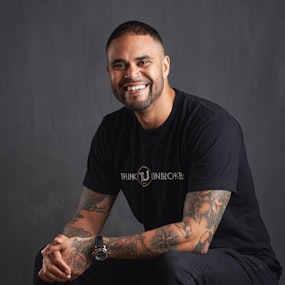
Michael Unbroken
Coach
Michael is an entrepreneur, best-selling author, speaker, coach, and advocate for adult survivors of childhood trauma.
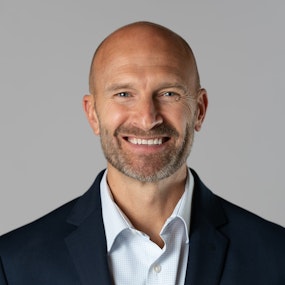
Jeff Wickersham
Coach
Jeff Wickersham, Morning Routine Guide and Founder of Morning Fire Coaching
I am a husband and dad to two wonderful sons. I live each day to the fullest and live by the mantra Rise, Fight, Love, Repeat. I enjoy working with clients one on one, in small groups, and with larger organizations to implement game changing habits for more energy, focus, abundance and time in their days.
Welcome to The Think Unbroken Podcast!
Here are some of my favorite recent guests!



























